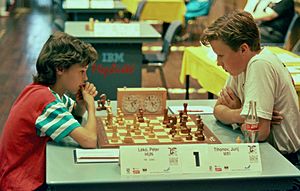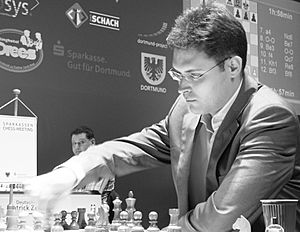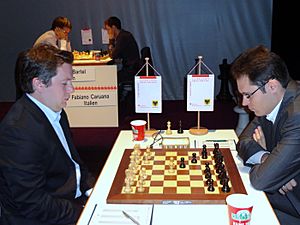Peter Leko facts for kids
Quick facts for kids Peter Leko |
|
|---|---|
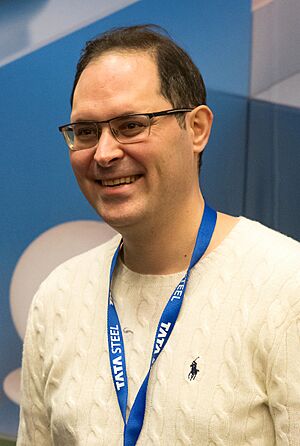
Leko in 2025
|
|
| Country | Hungary |
| Born | September 8, 1979 Subotica, Vojvodina, SR Serbia, SFR Yugoslavia |
| Title | Grandmaster (1994) |
| FIDE rating | 2663 (February 2026) |
| Peak rating | 2763 (April 2005) |
| Peak ranking | No. 4 (April 2003) |
Peter Leko, born on September 8, 1979, is a famous chess player from Hungary. He is a Grandmaster and also works as a chess commentator. In 1994, he became the youngest Grandmaster in the world at that time.
He almost won the World Chess Championship in 2004. The match ended in a 7-7 tie, so Vladimir Kramnik kept his title. Peter Leko also placed fifth in the 2005 FIDE World Chess Championship and fourth in the 2007 World Chess Championship.
Leko has won many big chess tournaments. These include events in Dortmund, Linares, Wijk aan Zee, and the Tal Memorial in Moscow. He has won two team silver medals and one individual gold medal for Hungary at the Chess Olympiads. He also earned team bronze and silver medals, plus an individual silver medal, at the European Team Championships. Peter Leko reached his highest ranking of fourth in the FIDE world rankings in April 2003.
Contents
Peter Leko's Early Life
Peter Leko was born in Subotica, Yugoslavia, to a Hungarian family. He moved to Szeged when he was one year old. His father taught him chess just before he turned seven. He started playing in tournaments when he was nine.
His first coach, Tibor Károlyi, started working with him in 1989. They stopped working together three months before Leko became a Grandmaster. They later worked together again from 1998 to 2000. Leko also worked with International Master Gaspar Mathe when he was ten.
As a junior player, Leko competed in the World Youth Chess Championship. He won bronze in the Under-10 group in 1989. He also won bronze in the Under-12 group in 1990. In 1993, he earned a silver medal in the Under-14 group. He finally won gold in the Under-16 group in 1994.
Becoming a Grandmaster
Leko earned the International Master title in 1992. In 1994, he became a Grandmaster at 14 years, 4 months, and 22 days old. At that time, he was the youngest player to do so, breaking the record held by Judit Polgár. He achieved the necessary scores (called "norms") at a tournament in Budapest and in Leon in 1993. He also shared third place at Hoogovens in 1994.
Rising to the Top in Chess
Leko showed his skill by winning in Copenhagen in 1995. He scored 8 points out of 11 games. Soon after, he played in Dortmund. There, he shared third place with Vasyl Ivanchuk. This helped him reach 55th in the world rankings with an Elo rating of 2605.
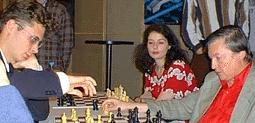
Leko continued to climb the rankings. He took second place behind Viswanathan Anand at Tilburg in 1998. He also placed fourth in Dortmund and Linares in early 1999. Leko's great form led to his first major tournament win in Dortmund. He finished half a point ahead of Vladimir Kramnik. It was at this tournament that he met his future wife, Sofia.
He first played in the FIDE World Chess Championship 1999 in Las Vegas. He won against Christian Bauer but lost to Sergei Movsesian in a tiebreak. In January 2000, Leko played a six-game match against the FIDE World Champion, Alexander Khalifman, in Budapest. Leko won the match 4½-1½.
Leko continued his success by sharing second place at Corus in 2000. He was behind a very strong Garry Kasparov. At the FIDE World Chess Championship 2000, Leko was knocked out in the third round by Khalifman after tiebreaks.
In 2001, Leko had good results in Corus and Linares. He also won an eight-game Chess 960 match against Michael Adams. The year ended with an early exit from the FIDE World Chess Championship 2002 in Moscow.
Leko started 2002 well. He finished sixth at Corus and second at Essen.
Becoming a World Championship Challenger
In May 2002, an agreement was made for the winner of the Dortmund tournament to play the Classical World Chess Champion, Vladimir Kramnik. The Dortmund Chess Meeting was held in June 2002. It was a two-stage event. Players were divided into groups, and the top players moved to a knockout stage.
Leko easily qualified from his group. He then faced Alexei Shirov in a four-game match, winning 2½-½. In the final, Leko played Veselin Topalov. Leko won the match 2½-1½. This made him the official challenger for Vladimir Kramnik in the Classical World Chess Championship 2004.
After this win, Leko led the Hungarian team to a silver medal at the 35th Chess Olympiad. He played without losing a single game. In early 2003, he shared first place at Linares with Kramnik. He was half a point ahead of Anand and Kasparov. This win notably ended a ten-tournament winning streak by Kasparov.
The 2004 World Championship Match
After some delays, Leko played in the Classical World Chess Championship 2004. The match took place from September 25 to October 18, 2004, in Brissago, Switzerland. Leko had help from Vladimir Akopian, Arshak Petrosian, and Vladislav Tkachiev.
In the match, Leko lost the first game. He made a mistake in a complex endgame. After two short draws, Game 4 was a tough draw. Leko then tied the match in Game 5. He changed his opening strategy and managed to win a difficult endgame. Game 6 was a quick draw. In Game 7, Leko was surprised by Kramnik's opening. The game quickly led to a draw, making the score 3½–3½ at halftime.
In Game 8, Leko won an important game, taking the lead for the first time. Kramnik allowed Leko to play the aggressive Marshall Attack. Kramnik had prepared a queen sacrifice, but Leko found a way to use it to his advantage and win.
After two more draws, Game 10 saw Leko successfully defend against Kramnik's opening. This led Leko to change his opening for Game 12 to the Caro-Kann. Kramnik pushed hard, but Leko defended well and secured a draw.
In Game 13, Kramnik tried a different opening, the Benoni Defence, to get a win. He launched an attack, but Leko defended precisely. The game ended in a draw.
In the dramatic final Game 14, Leko only needed a draw to win the Championship. Kramnik played an aggressive line against Leko's Caro-Kann. Leko's plan to simplify the position did not work. Kramnik broke through Leko's defenses. Leko resigned when he was about to be checkmated. The match ended in a 7–7 tie. According to the rules, Kramnik kept his title as Classical World Champion.
Peter Leko's Career After 2004
Even though the match was a draw, Leko continued to play at a high level in 2005. He won the Corus tournament and finished fourth at Linares. He also played a rapid match against Michael Adams, which ended in a 4-4 tie. Leko then competed for the FIDE World Chess Championship title in San Luis, Argentina, finishing fifth.
In 2006, Leko had good results in several tournaments. He won a rapid match against Anatoly Karpov. He also shared first place at the first Tal Memorial tournament. This win meant he had achieved a "Grand Slam" of major tournament victories. He had now won in Dortmund, Linares, Corus, and Tal Memorial.
Leko regained his form for the Candidates Matches in 2007. These matches chose four players for the World Chess Championship 2007. Leko easily won his matches against Mikhail Gurevich and Evgeny Bareev. This qualified him for the main championship tournament. A few months later, he won the ACP World Rapid Chess Cup. At the World Chess Championship in Mexico City, Leko finished in fourth place.
In 2008, Leko tied for fifth at Corus. He also won his third victory at Dortmund. He secured an individual gold medal on board 1 at the 38th Chess Olympiad in Dresden.
Leko took part in the FIDE Grand Prix 2008-2010 series. He finished seventh overall, even though he didn't win any of the events. In 2009, Leko lost a rapid match against Viswanathan Anand. He tied for second place in a strong Dortmund tournament. He also finished fourth in Nanjing, China.
After representing Hungary in the 39th Chess Olympiad in September 2010, he took a break from chess. He returned to chess at the World Team Chess Championship in July 2011. He played on board 1 and remained undefeated.
In April 2012, Leko played for Moscow's SHSM-64 team. He then came second at the Sigeman & Co Tournament. At Dortmund, Leko shared third place with Kramnik and others. He also scored well at the 40th Chess Olympiad in Istanbul.
In September 2012, he joined the FIDE Grand Prix 2012-13 series. He finished fifth in London and tied for seventh in Tashkent. In April 2013, he tied for seventh in Zug. He tied for third place at the fifth event in Beijing. Leko finished the Grand Prix cycle in 13th place.
Outside of the Grand Prix, Leko helped his SHSM team get third place at the European Chess Club Cup in October 2012. He also played in the World Mind Games. In January 2013, he placed a strong fifth at the Tata Steel Chess event. In August 2013, Leko was knocked out of the FIDE World Cup 2013 in the second round.
In April 2014, Leko played in the Russian Team Championships. In July, he tied for second at Dortmund. He also helped his team win a silver medal at the 41st Chess Olympiad. In August 2015, he played a 6-game match against Chinese Grandmaster Li Chao in Hungary. He lost the match.
Since November 2017, Peter Leko has been coaching the German chess talent Vincent Keymer.
Team Chess Achievements
Leko first played for Hungary at the 31st Chess Olympiad when he was 15. He has played in nine more Chess Olympiads, winning two team silver medals and one individual gold medal.
| Olympiad | Individual result | Team result |
|---|---|---|
| Moscow 1994 | 6½/10 (11th) | 8th |
| Yerevan 1996 | 7/12 (33rd) | 18th |
| Istanbul 2000 | 7½/12 (20th) | 4th |
| Bled 2002 | 6/11 (48th) | Silver |
| Dresden 2008 | 7½/10 (Gold) | 8th |
| Khanty-Mansiysk 2010 | 4½/10 (23rd) | 4th |
| Istanbul 2012 | 5½/10 (17th) | 9th |
| Tromso 2014 | 5/10 | Silver |
| Batumi 2018 | 5/10 | 18th |
| Budapest 2024 | 5/9 | 11st |
Leko also played in many Team Chess Championships. These include both World and European events. He first played in Debrecen in 1992 when he was 13 years old.
| Event | Individual result | Team result |
|---|---|---|
| 10th ETCC, Debrecen 1992 | 5/9 (13th) | 5th |
| 12th ETCC, Batumi 1999 | 6/9 (Silver) | Silver |
| 5th WTCC, Yerevan 2001 | 3/7 (7th) | 5th |
| 18th ETCC, Halkidiki 2011 | 5½/9 (10th) | Bronze |
| 8th WTCC, Ningbo 2011 | 5½/9 (5th) | 5th |
Peter Leko's Chess Style
Peter Leko is known for playing in a very solid and careful way. He tries to avoid taking big risks. He once said, "I like to play in a 'clean and clear' way. I am definitely not the type of guy who takes unnecessary risks." He believes in the logic of the game more than gambling.
Jacob Aagaard, another chess expert, said that Leko has a great opening strategy. He is also a very skilled technical player. Even though some people say his style leads to too many draws, his consistent play has kept him among the best players. He has won many top-level tournaments since he was a teenager.
Leko has also helped other top players in World Championship matches. He was a "second" (an assistant) for Anand in 1997, for Kramnik in 2008, and for Anand again in 2013. This shows his deep understanding of chess openings.
A Sample Game
In 2005, Leko won the famous Corus chess tournament. On his way to victory, he beat Viswanathan Anand with the black pieces. Here are the moves from that game:
1. e4 c5 2. Nf3 Nc6 3. d4 cxd4 4. Nxd4 Nf6 5. Nc3 e5 6. Ndb5 d6 7. Bg5 a6 8. Na3 b5 9. Bxf6 gxf6 10. Nd5 f5 11. c3 Bg7 12. exf5 Bxf5 13. Nc2 0-0 14. Nce3 Be6 15. Bd3 f5 16. 0-0 Ra7 17. a4 Ne7 18. Nxe7+ Rxe7 19. axb5 axb5 20. Bxb5 d5 21. Ra6 f4 22. Nc2 Bc8 23. Ra8 Qd6 24. Nb4 Bb7 25. Ra7 d4 26. Ba6? (see diagram)
- A better move for White was 26.Bc6.
26... Bxg2! 27. Bc4+ Kh8 28. Ra6 Qc5 29. Kxg2 f3+ 30. Kh1 Qxc4 31. Rc6 Qb5 32. Rd6 e4 33. Rxd4 Bxd4 34. Qxd4+ Qe5 35. Qxe5+ Rxe5 36. Nc2 Rb8 37. Ne3 Rc5 38. h3 Rxb2 39. c4 Rg5 40. Kh2 Kg8 41. h4 Rg6 42. Kh3 Kf7 43. Nf5 Rc2 44. Ne3 Rd2 45. c5 Ke6 46. c6 Rg8 47. c7 Rc8 48. Kg3 Rxc7 49. Kf4 Rd4 50. Ra1 Rf7+ 51. Kg3 Rd8 52. Ra6+ Ke5 53. Ng4+ Kd5 54. Nf6+ Rxf6 55. Rxf6 Ke5 56. Rh6 Rg8+ 57. Kh3 e3 0–1
Peter Leko's Personal Life
Peter Leko is married to Sofia Petrosian. She is the daughter of Armenian Grandmaster Arshak Petrosian, who is also Leko's chess trainer. Peter Leko is a vegetarian.
See also
 In Spanish: Péter Lékó para niños
In Spanish: Péter Lékó para niños
 | William L. Dawson |
 | W. E. B. Du Bois |
 | Harry Belafonte |


